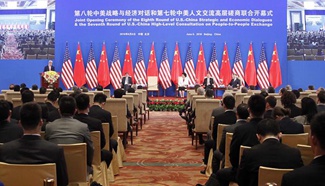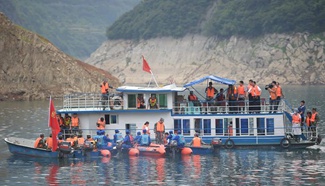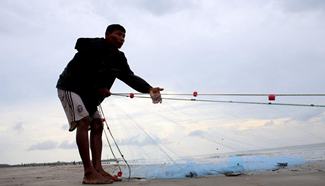|
|
An aerial photo taken on Sept. 25, 2015 from a seaplane of Hainan Maritime Safety Administration shows cruise vessel Haixun 1103 heading to the Yacheng 13-1 drilling rig during a patrol in south China Sea. (Xinhua/Zhao Yingquan)
BERLIN, June 5 (Xinhua) -- Philippines' assertion concerning the South China Sea (SCS) abused the international law and the United States' interference is only a show of hegemony that does no good to anybody, Chinese overseas scholars said Sunday at a seminar in Berlin.
The seminar, themed "The South China Sea Issue: China's Stance, International Voice", gathered several Chinese overseas scholars in Germany, The Netherlands and other European countries.
It was also attended by more than 50 representatives of Chinese students studying in Berlin, Chinese enterprises and overseas Chinese living in Germany.
Noting the SCS case unilaterally initiated by the Philippines in 2013, Qiu Rungen, visiting scholar at Berlin's Humboldt University and an expert on international economic law, said that such an arbitration, though deliberately wrapped up, actually violates the legislative purpose of the United Nations Convention on the Law of the Sea (UNCLOS) and its juridical logic.
In fact, China and the Philippines have agreed in bilaterally-signed documents to settle SCS disputes through dialogues and negotiations. Additionally, China made a declaration in 2006 that excluded a compulsory arbitration under Article 298 of the UNCLS.
Given these facts, Qiu said that China's assertion of neither accepting nor participating in the SCS arbitration is not only fully in line with the UNCLOS but also meets the basic legal principle of international laws.
It's evident that the Philippines has abused the legal procedure to initiate the unilateral arbitration and the international tribunal's jurisdiction over the case was marred with nomological bias, said Luo Gang, a doctoral student specialized in international law in Germany.
The SCS international arbitration tribunal in The Hague announced its jurisdiction over the case in October 2015, and prepares to deliver a ruling in the next few months. However, the combination of the tribunal and its judging process are questioned by a number of Chinese and international scholars.
The U.S. role messing up the SCS was also discussed by the Chinese scholars.
The United States has made a series of harsh rhetoric on the SCS issue, mostly accusing China of threatening the freedom of navigation, while it itself exercised several military operations by closely flying or sailing past South China Sea islands, violating China's sovereign rights and adding tension to the region.
The arbitration case shows that the United States can not tolerate the rise of China and has fancied China's development a challenge to the America-dominated international order, Humboldt University Law doctoral student Li Ke pointed out.
U.S. words and deeds expose once again that the American hegemony is accustomed to use so-called "rules" to pursue power politics, Li added.
The Chinese scholars attending the seminar all agreed that the "disputed" Nansha Islands have long been part of the Chinese territory, which is not only supported by numerous historical evidence since ancient times, but also by the many international treaties from modern times.
They voiced opposition to the Philippines' illegal seizure of China's Nansha Islands and reefs, calling for more support to safeguard the international law and the legal interest of China.
Chinese overseas scholars should help to have more voices from China heard on the international arena for a peaceful resolution of the South China Sea disputes, said Wang Qi, doctoral candidate for law at the Free University of Berlin, who is also an organizer of the seminar.
Related:
BEIJING, June 2 (Xinhua) -- The Chinese Society of the Law of the Sea has issued a statement on the South China Sea arbitration initiated by the Philippines. Following is the English version of the statement: Full story
Spotlight: China will not fall into trap of South China Sea arbitration: Chinese ambassador
JOHANNESBURG, June 2 (Xinhua) -- China will not give certain countries the satisfaction of tricking it into the trap of the South China Sea arbitration, Chinese Ambassador to South Africa, Tian Xuejun, said on Thursday.
In an article carried by Independent Media's nationwide newspaper The Star, Tian reveals the fallacy of the arbitration and reiterates the legitimacy of China's decision of neither participating in nor accepting the arbitration. Full story
Old map shows the Philippines' claim over South China Sea islands groundless
NEW YORK, May 29 (Xinhua) -- An old map published in 1899 by geographer J. Martin Miller shows that islands in the South China Sea have never been Philippine territory, Zeng Yingjing, the owner of the map, has told Xinhua.
The map was included in a book titled "The Twentieth Century ATLAS and Illustrated World," which was purchased by Zeng, a Chinese-American, at a flea market in New York in 2015. Full story












